Editor:
Brandon Sweet
University Communications
bulletin@uwaterloo.ca
Office of Equity, Diversity, Inclusion & Anti-racism releases Strategic Plan Framework
A message from the Office of Equity, Diversity, Inclusion & Anti-racism (EDI-R).
Following our response to the Human Rights, Equity, and Inclusion (HREI) organizational review report, the EDI-R Office had paused non-essential work during the month of December to invest our time into the reflection, planning, and building of our 2022-2025 Strategic Plan. We are deeply grateful to the University of Waterloo community for understanding the need for this pause, and as a result, we are pleased to share the framework of our 2022-2025 Strategic Plan.
Drawing on our mission to build, incubate and enhance EDI-R competency and capacity across campus to identify and interrupt institutional barriers and embed equity within policies, processes, environments and experiences at the University of Waterloo we are committed to reaching the following goals by 2025:
- Lead and facilitate culture change
- Ensure EDI-R leadership is centralized, accessible and accountable
- Increase the financial sustainability of the EDI-R Unit
This framework will guide the rest of our strategic plan which will be released May 2022.
In addition to the framework, we are excited to launch two new EDI-R projects and initiatives:
Program Area Leads (PALs)
We are recruiting 20 staff and faculty from across UWaterloo to help assist with embedding equity and anti-racism in their units/areas. The PALs program aims to develop and support new and existing EDI-R leads to assist with the centralizing and harmonizing of this work. If you know anyone who may be a great fit, please encourage them to apply here.
EDI-R Intake Form
The EDI-R office is here to support you. To help us best identify and support the needs of our campus community, we have launched an online intake form where individual or departmental requests can be made. These requests can include recommending new projects, a training request, disclosure of harm, general EDI-R inquiry etc.
Additional EDI-R projects that will be launched within the calendar year include:
- AIWL: Advancing into Waterloo Leadership: a pilot program that aims to support racialized employees achieve transferable skills and knowledge to advance into senior leadership/management roles.
- EDI-R Office Fellowship Program
- Anti-Racism Impact Assessment
As you review the framework and new projects, we welcome and look forward to your feedback. Please share any comments, suggestions, or questions by emailing: equity@uwaterloo.ca.
Indigenous Relations office welcomes new coordinator
A message from the Office of Indigenous Relations.
Effective today, Kevin George joins the Office of Indigenous Relations team as the Indigenous Special Projects Coordinator. Kevin is Potawatomi and Cree and a member of the Chippewas of Kettle and Stony Point First Nation located on the shores of Lake Huron and has strong community connection to Fort McMurray 468 First Nation, his Cree community in Northern Alberta.
Kevin has been a University of Waterloo employee since 2020 and is coming to the Indigenous Relations team from Plant Operations. In his new role Kevin will advance the work of the Office of Indigenous Relations with a focus on communications, events, and management of special initiatives and projects. Kevin brings experience in project management, communications, and community building gained through his employment and volunteer experience including the Kitchener Waterloo Youth Basketball Association and Anishinaabeg Outreach. Kevin is an active member of the growing Indigenous community on campus.
Please join us in welcoming Kevin to the Indigenous Relations team.
Have your say: Canadian Graduate and Professional Student Survey launches today
A message from Graduate Studies and Postdoctoral Affairs (GSPA).
The 2022 Canadian Graduate and Professional Student Survey (CGPSS) launches today, asking Waterloo graduate students to share their thoughts about their university experience. The survey, sent via email as a personalized link, will seek feedback on topics such as satisfaction of graduate student financial support, professional development, graduate program choices and university services.
The purpose of this national survey is to improve teaching, learning, graduate student services, programs, student support and overall campus life for current and future graduate students. It takes place once every three years, and is administered in collaboration with Institutional Analysis and Planning (IAP), Graduate Studies and Postdoctoral Affairs (GSPA), and the Graduate Student Association-UWaterloo (GSA-UW).
Previous survey results have been used to make improvements to graduate student services such as:
- Development of policy workshops
- The launch of a graduate petitions process
- Remote engagement – the creation of a fully online version of Professional Skills Foundations
- More graduate student social spaces – funding of the Graduate House patio expansion
Graduate students, voice your opinion. Check your email today for a personalized survey link.
The future of specialist care in Africa
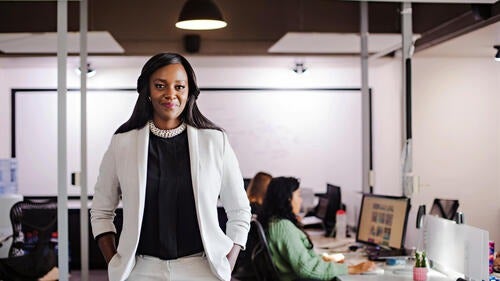
By Stephanie Longeway. This is an excerpt of an article originally published in Waterloo News.
Infertility is a health issue for many people around the world that can also lead to broader social and economic consequences. However, access to treatment can be difficult or nearly impossible in many regions.
“Seventy million people on the African continent are impacted by infertility,” says Margaret Mutumba, a PhD candidate in Public Health and Health Systems. “But access to health care can be challenging, and even more challenging when you need to see a specialist.”
Mutumba was born and raised in Uganda, and after completing her master’s degree in England, she returned home to work in health care. She has overseen fertility clinics in Uganda, Tanzania, Rwanda and Zambia, and has witnessed firsthand the barriers patients face.
Accessing care is difficult because there are generally too few specialists and clinics to serve this vast geographical region.
“Only 21 countries out of 53 have fertility clinics. It’s not enough,” Mutumba says. This has led to major delays in patients being able to seek the treatment they need. Many couples are also required to travel far distances to larger urban centres to access in-person care, adding to the cost of an already expensive service.
Thinking outside traditional health systems
Mutumba knew a solution to create more accessible care was needed. She founded MedAtlas, an affordable telemedicine healthcare platform that connects patients to a specialist from anywhere in Africa. But becoming an entrepreneur was not her original goal when she began her journey to better support patients.
“I never saw myself as an entrepreneur. Coming from a public health background, I have always been used to working in established traditional systems,” says Mutumba, who had been working for eight years in traditional clinic settings. “It wasn’t until I attended a Concept pitch competition that I thought, ‘I could do this.’”
The Concept $5K pitch competition gives Waterloo students with innovative solutions and high-potential business ideas the opportunity to showcase their work and compete for grant funding. Participants receive valuable feedback, pitching experience and idea validation from a network of entrepreneurs and coaches.
“Being at the University of Waterloo, and having access to this entrepreneurship ecosystem, has given me the technical expertise and coaching to guide me through the process of building a startup,” Mutumba says.
The future of health care in Africa
MedAtlas is focused on building a digital network of licensed specialists to offer accessible and affordable care. The startup launched with 10 doctors serving four countries: Uganda, Zambia, Tanzania and Rwanda. With new funding from Concept, Mutumba plans to expand into West African nations and add an additional 20 doctors to the team.
Currently, the technology provides holistic fertility care that treats patients’ physical health as well as offering mental health supports and counselling.
“There is a lot of social stigmas around infertility and there is a huge psychological component when going through this journey,” Mutumba says. Along with the emotional and economic strain infertility can have, there is often devastating social and cultural stigma, particularly for women.
MedAtlas also allows for the added comfort of seeking treatment from a patient’s own home. “Using digital technology means patients don’t have to travel to consult with a doctor, so there is an added element of privacy.”
Mutumba is not planning to stop here. She has a vision to grow MedAtlas so that it offers more specialized care across the continent. “I want MedAtlas to create the future of specialist health care in Africa,” she says.
Read the rest of the article on Waterloo News.
Scenes from an active campus
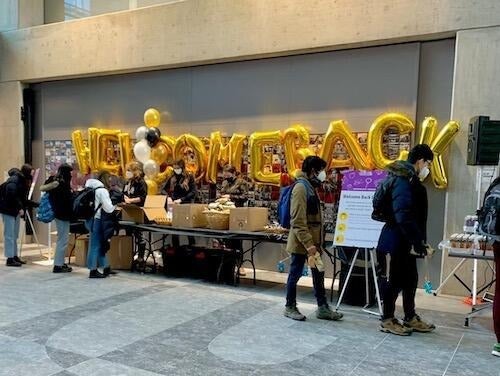
It's been a week since students returned to campus for ever-increasing in-person activities, and our colleagues in Digital Communications put out the call for photos showing how campus is returning to life in February. Here is a selection of images:
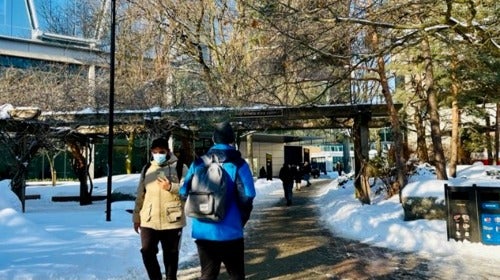
Students walk through the Peter Russell Rock Garden.
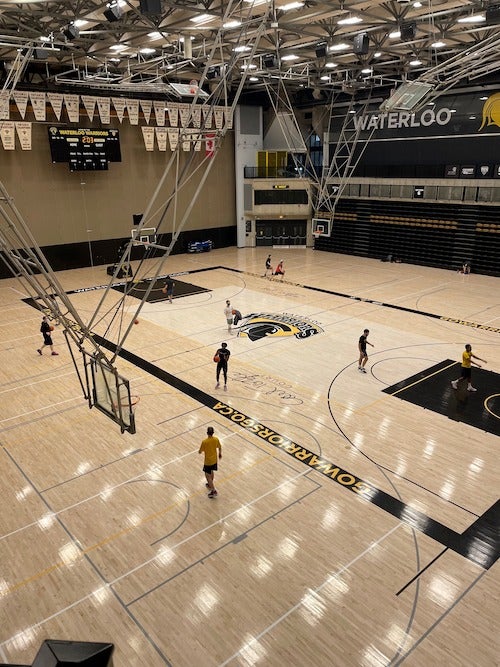
Students play basketball in the Physical Activities Complex.
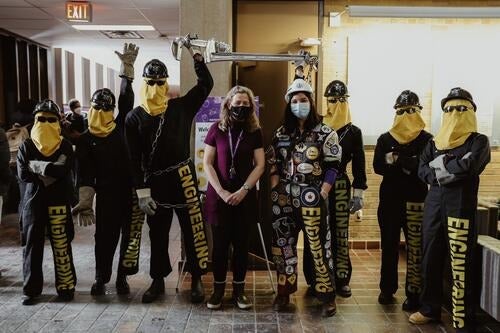
Dean of Engineering Mary Wells, Engineering Society President Kathrine von Friedl, the stalwart Tool Bearers and the eponymous Tool (making a special public appearance in honour of the return to campus).
Link of the day
When and Where to get support
Students can visit the Student Success Office online for supports including academic development, international student resources, immigration consulting, leadership development, exchange and study abroad, and opportunities to get involved.
Instructors looking for targeted support for developing online components for blended learning courses, transitioning remote to fully online courses, revising current online courses, and more please visit Agile Development | Centre for Extended Learning | University of Waterloo (uwaterloo.ca).
Instructors can visit the Keep Learning website to get support on adapting their teaching and learning plans for an online environment.
Course templates are available within your course in LEARN to help you build and edit your content and assignment pages quickly.
The following workshops, webinars, and events are offered by the KL team (CTE, CEL, ITMS, LIB):
- Independent Remote Course Design Essentials, self-directed, continuous self-enrollment course in LEARN.
- Independent Blended Course Design (iBlend), self-directed, ongoing
- Copyright Overview for Waterloo Instructors and Staff - self-directed, continuous self-enrollment course in LEARN.
- Thirty Minute Thursdays - PebblePad - Offered: February 17, March 3, and 10, 12:00 noon - 12:30 p.m.
Employees can access resources to help them work remotely, including managing University records and privacy of personal information. Here are some tips for staying healthy while working from home.
The Writing and Communication Centre has virtual services and programs to help undergrads, grad students, postdocs and faculty members with academic writing.
- Meet with writing advisors in one-to-one appointments to brainstorm, draft, revise, and polish. No time for an appointment? Try email tutoring for undergrads.
- Beat isolation and make writing progress at weekly Virtual Writing Cafés for grad students and faculty or PJ-Friendly Writing Groups for Undergrads.
- Take an online workshop or apply to our popular Dissertation Boot Camp program.
- Faculty can request custom in-class workshops for their courses, or the WCC can facilitate any existing workshops for student groups.
- Course-integrated support available. Attention faculty and instructors: The application form for Writing and Communication Centre course-integrated support is now available online. We offer five unique support streams for your courses including synchronous and asynchronous workshops and monitored discussion boards.
Co-op students can get help finding a job and find supports to successfully work remotely, develop new skills, access wellness and career information, and contact a co-op or career advisor.
The Centre for Career Action (CCA) is currently offering virtual services only. Questions about CCA's services? Live chat or call 519-888-4047 between 8:30 a.m. and 4:30 p.m. EST, Monday to Friday.
Drop-in to Warrior Virtual Study Halls on Wednesdays from 5:30 p.m. to 7:00 p.m. Come together in this virtual space to set goals and work independently or in groups each week.
Renison's English Language Institute continues to offer virtual events and workshops to help students practice their English language skills.
If you feel overwhelmed or anxious and need to talk to somebody, please contact the University’s Campus Wellness services, either Health Services or Counselling Services. You can also contact the University's Centre for Mental Health Research and Treatment. Good2Talk is a post-secondary student helpline available to all students.
The Library is open with expanded hours for access to book stacks, drop-in individual study space, bookable group study rooms, drop-in access to computers and printers, book pick-up services and IST Help Desk support. Librarian consultations, Special Collections & Archives and the Geospatial Centre are available by appointment. Full details on current services and hours are available on the Library’s COVID-19 Update webpage.
The Faculty Association of the University of Waterloo (FAUW) continues to advocate for its members. Check out the FAUW blog for more information.
The University of Waterloo Staff Association (UWSA) continues to advocate for its members. Check out the UWSA blog for more information.
The Sexual Violence Prevention and Response Office (SVPRO) supports all members of the University of Waterloo campus community who have experienced, or been impacted, by sexual violence. This includes all students, staff, faculty and visitors on the main campus, the satellite campuses, and at the affiliated and federated Waterloo Institutes and Colleges. For support, email: svpro@uwaterloo.ca or visit the SVPRO website.
The Office of Indigenous Relations is a central hub that provides guidance, support, and resources to all Indigenous and non-Indigenous campus community members and oversees the University's Indigenization strategy.
The Waterloo Indigenous Student Centre, based at St. Paul’s University College, provides support and resources for Indigenous students, and educational outreach programs for the broader community, including lectures, and events.
WUSA supports for students:
Peer support - MATES, Glow Centre, RAISE, Women’s Centre - Visit https://wusa.ca/peersupport to book an appointment either in person or online for the Fall term.
Food Support Service food hampers are currently available from the Turnkey Desk 24/7 in the Student Life Centre. Drop off locations are also open again in SLC, DC, DP, SCH and all residences.
Co-op Connection all available online. Check https://wusa.ca for more details.
Centre for Academic Policy Support - CAPS is here to assist Waterloo undergraduates throughout their experience in navigating academic policy in the instances of filing petitions, grievances and appeals. Please contact them at caps@wusa.ca. More information is available.
WUSA Student Legal Protection Program- Seeking legal counsel can be intimidating, especially if it’s your first time facing a legal issue. The legal assistance helpline provides quick access to legal advice in any area of law, including criminal. Just call 1-833-202-4571.
Empower Me is a confidential mental health and wellness service that connects students with qualified counsellors 24/7. They can be reached at 1-833-628-5589.
GSA-UW supports for graduate students:
The Graduate Student Association (GSA-UW) supports students’ academic and social experience and promotes their well-being.
Advising and Support - The GSA advises graduate students experiencing challenges and can help with navigating university policies & filing a grievance, appeal, or petition.
Mental Health covered by the Health Plan - The GSA Health Plan now has an 80% coverage rate (up to $800/year) for Mental Health Practitioners. Your plan includes coverage for psychologists, registered social workers, psychotherapists, and clinical counselors.
Dental Care - The GSA Dental Plan covers 60 per cent to 70 per cent of your dental costs and by visiting dental professionals who are members of the Studentcare Networks, you can receive an additional 20 per cent to 30 per cent coverage.
Student Legal Protection Program - Your GSA fees give you access to unlimited legal advice, accessible via a toll-free helpline: +1-833-202-4571. This advice covers topics including housing disputes, employment disputes, and disputes with an academic institution.
The Graduate House: Open Monday to Friday 11:30 a.m. to 6:00 p.m. - We’re open to all students, faculty, staff, and community members. The Graduate House is a community space run by the GSA-UW. Capacity is limited to 50 per cent, and Government ID and Vaccination Records will be required for all dine-in guests. Graduate students who paid their fees can still get discounts and free coffee.
When and Where (but mostly when)
Warriors vs. Laurier Blood Donation Battle. Join our “Waterloo Warriors” team on the Blood.ca website or app. #ItsInYouToGive
Healthy Warriors at Home, free online programs including Nutrition Guides, Personal Training Consults, Health Webinars, Mindfulness Courses and On-demand Fitness. Sign up now.
GSA-UW presents Safe Love Week 2022, Monday, February 14 to February 18.
Cheriton School of Computer Science Distinguished Lecture Series, "AI for Social Impact: Results from Deployments for Public Health and Conservation," featuring Milind Tambe, Professor of Computer Science, Harvard University, Tuesday, February 15 at 1:30 p.m. Online via Zoom.
NEW - Nanotechnology Innovation in the Water Sector, a 90-minute showcase featuring the latest nano-water technology innovation from the University of Waterloo, Tuesday, February 15, 12:00 noon.
NEW - Noon Hour Concert: Double Double Bass, Wednesday, February 16, 12:30 p.m., online premiere.
NEW - GEDI Exchange Webinar - A 30 Minute Exchange with Profound Impact and 1Mentor, Wednesday, February 16, 1:00 p.m.
NEW - Research Talks with The Right Honourable Michaëlle Jean, “Black History is World History: From Moment to Global Movement,” Thursdsay, February 17, 3:00 p.m. to 4:30 p.m. Registration is required.
NEW - WaterTalk: The Next Water Revolutions, presented by David Sedlak, Thursday, February 17, 1:00 p.m.
NEW - FASS Theatre Company presents FASS-o-VISION, Friday, February 18 and Saturday, February 19, 8:00 p.m., performed live via YouTube.